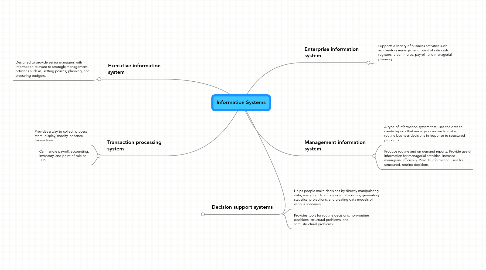Information Systems
by mike adolph

1. Executive information system
1.1. Designed to provide senior managers with information relevant to strategic management activities such as, setting polices, planning, and preparing budgets.
2. Transaction processing system
2.1. Provides a way to collect, process, store, display, modify, or cancel transactions.
2.2. Can handle payroll, accounting, inventory, and point of sale or POS.
3. Decision support systems
3.1. Helps people make decisions by directly manipulating data, analyzing data from external sources, generating statistical projections, and creating data models of various scenarios.
3.2. Provides tools for routine decisions, non-routine decisions, structural problems, and semi-structural problems.
4. Enterprise information system
4.1. Supports a variety of business activities such as inventory management, point of sale cash registers, e-commerce, payroll, and managerial planning.
5. Management information system
5.1. A type of information system that uses the data to create reports that managers can use to make routine business decisions in response to structured problems.
5.2. Produce routine and on demand reports. Provide useful information for managerial activities. Increase managerial efficiency. Provide information used for structured, routine decisions.


